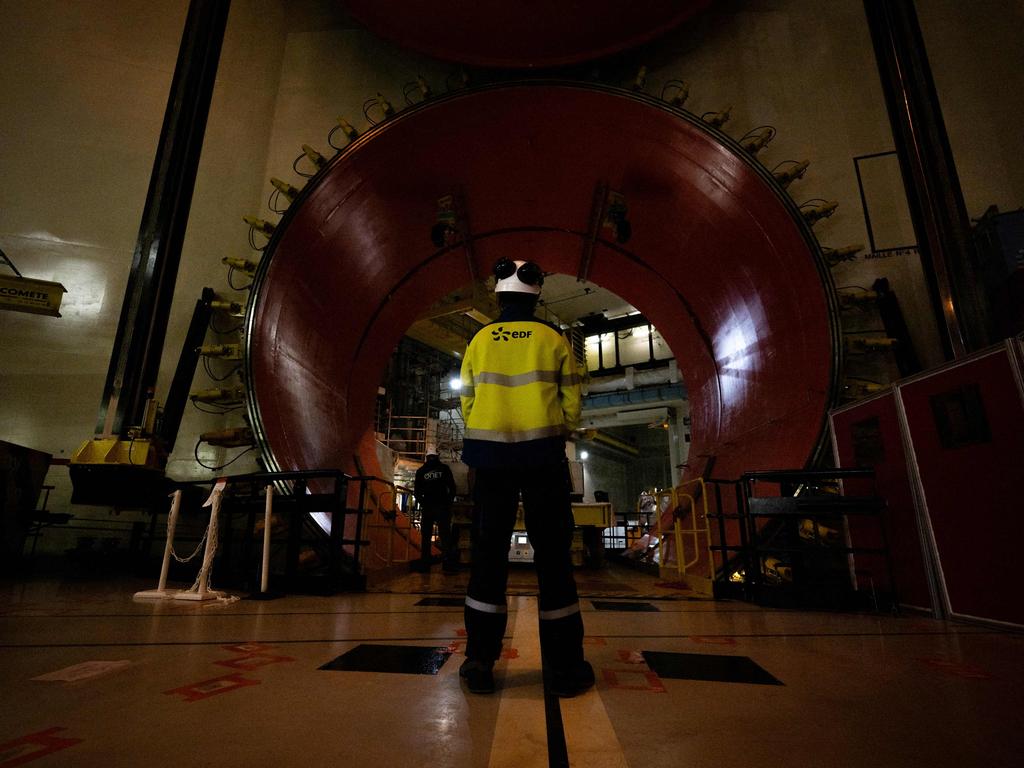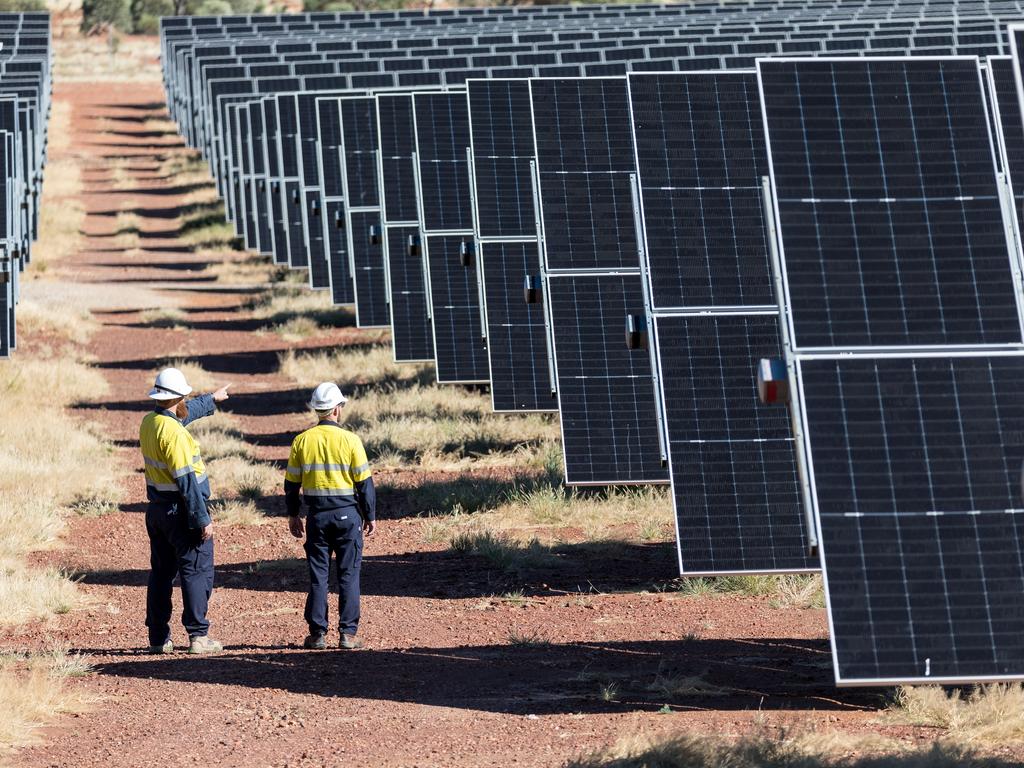
Germany’s extravagant emissions targets and its decision to abandon nuclear power have turned a once solid and reliable power network into Europe’s most expensive. The political fixation on renewable energy has shackled Germany’s fortunes to fluctuations in the weather and international gas prices.
Chris Bowen’s visit to Berlin at the start of last year should have alerted him to the dangers of this disastrous ideological experiment. Yet, like a fellow traveller in the 1950s visiting Moscow, the Energy Minister returned convinced he had captured a glimpse of an earthly paradise.
How else do we explain his contribution to The Australian last week, refuting the claim that Australia is out of step with other G20 countries by rejecting nuclear. “What about Germany?” the minister wrote.
What about Germany, indeed. Germany is one of the world’s wealthiest and most technically adept countries, the country of Vorsprung durch Technik. We have German innovation to thank for the 263mm hollow secondary transmission shaft that directs power in two directions and stops cars sliding off the road. We have the Germans to thank for X-ray technology, automatic washing machines and toothpaste.
This clever nation has had 13 years to develop a reliable electricity grid powered by dispersed, weather-dependent generators. It has comprehensively failed.
Household power in Germany was the highest in Europe in the second half of last year at €0.4020 (66c) per kWh, 41 per cent above the EU average. In second place was Ireland, another country besotted with wind power and which found itself trapped in an abusive relationship with the volatile international gas market.
The need for reliable backup energy drove Germany into the hands of the Russian oligarchs who control exports of liquid natural gas. When Russia invaded Ukraine, Germany was in big trouble.

Gas prices have fallen 90 per cent from the record levels of 2022, which allows Bowen to claim power prices have come down. Yet the European benchmark for gas is almost two-thirds higher than at the same time in 2019, according to commodities pricing agency Argus. High prices are here to stay.
The industrial electricity cost tripled in Germany between 2019 and 2023, prompting industrialists to look for the exit sign. A survey by the German Chamber of Commerce and Industry last September found 32 per cent of industrial companies were planning to relocate abroad or restrict domestic production because of risks from energy policy.
About 40 per cent of large industrial companies, those with 500 employees or more, were investigating moving offshore.
Bowen’s citation of German Chancellor Olaf Scholz as an authority on nuclear power hardly helps his case. In Germany, Scholz is widely regarded as one of the chief architects of Germany’s industrial and economic stagnation. A poll last August by Deutschland Trend showed Scholz’s left-leaning Social Democrats party (CDU) on just 14 per cent, one point behind the Greens.

In January, the head of the Federation of German Industries slammed Scholz’s energy policies as “absolutely toxic”. Siegfried Russwurm told the Financial Times Germany’s climate agenda was “more dogmatic than any other country I know”.
“Nobody can say with any certainty today what our energy supply will look like in seven years, and that’s why no one can say how high energy prices will be in Germany then,” he said. “We’re pursuing a goal of 100 per cent when it’s obvious the last 10 per cent is going to be incredibly expensive.”
A Prime Minister who was serious about a future made in Australia would ignore his Energy Minister’s blustering and ask him an awkward question: Why has the Energiewende policy considerably reduced the likelihood that the future will be built in Germany?
There are many reasons German industry is declining: bureaucratic logjams, skills shortages, and the inflexible exchange rate of the euro are just some. Business surveys consistently demonstrate that energy trumps them all, and that confidence in Germany’s energy transition process is sharply declining.
Energiewende started to go off-track in June 2011 when former chancellor Angela Merkel announced that Germany would phase out nuclear power. Merkel conceded transitioning to clean energy while phasing out both coal and nuclear power would be “very ambitious and challenging”. She was right. Three years after her retirement, it is clear almost nothing has gone to plan.
The electricity market swings erratically. On some days, there is so much electricity that generators have to pay wholesalers to take it off their hands. On other days, like Monday last week, spot prices surge to the maximum level of €9999 ($16,000) per MWh.
The construction of renewable energy infrastructure is way behind schedule. The Südlink transmission line, designed to link wind generators in the north to Bavaria, is chronically delayed.
Bowen’s claim that Germany’s emissions are declining is disingenuous, to say the least. The carbon intensity of German electricity has been falling at a rate of 11 grams per megawatt hour since 2011, which sounds mildly impressive until we note that emissions increased from 312g in 2020 to 366g in 2022. Germany aims to have a carbon-free grid by 3035, but at this pace it won’t get there until 2058, even if we assume the technology is up to scratch
If Bowen wants to convince us renewable energy is cheaper, he must explain why Europe’s renewable poster children, Germany, Ireland and Denmark, produce some of the most expensive electricity in the world. He must explain why electricity bills in nuclear nations such as Finland, Sweden, Hungary and Slovakia are significantly below the European average.
If he wants to persuade us renewable energy is reliable, he must explain why Germany so often pushes its interconnector with nuclear-powered France to the limit, as it did for two hours last Monday. If we are to be persuaded renewable energy is clean, he must explain why charging an electric car in Hamburg emits 10 times the amount of carbon it would if you stuck it in a ferry to Sweden and plugged it in there.
The renewable energy experiment turbocharged by Merkel promised a transition to a low-carbon economy powered by affordable and reliable energy. It has conspicuously failed to deliver any of these. The transition Germany is on course to achieve is from an export-orientated industrial economy to the new sick man of Europe, the label attached by Tsar Nicholas the First to the crumbling Ottoman empire.
Nick Cater is a senior fellow at the Menzies Research Centre and a visiting fellow at the Danube Institute.






If you want to know how to mess up an electricity grid, type Energiewende into your preferred search engine.